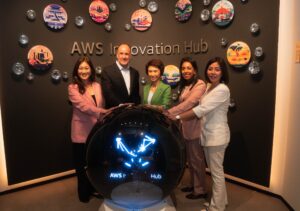NEC is the latest vendor to offer customisable generative artificial intelligence (AI) technology that includes hardware, software and services, with the aim of generating 50 billion yen (US$346 million) in revenue over the next three years.
The NEC Generative AI Service service, unveiled yesterday and available first in Japan, will provide access to licences for proprietary large language models (LLM), dedicated hardware, software, and consulting services.
The company also introduced an AI customer programme that enables it to collaborate with clients to develop LLM models and software. NEC says its LLM has a high level of Japanese language proficiency and comes in a compact size that runs on a standard GPU server.
To encourage the adoption of AI, NEC has launched the NEC Generative AI Hub with researchers and prompt engineers to work on potential new projects.
NEC will work with Microsoft and use the Microsoft Azure OpenAI Service, which promises secure data handling, with NEC’s technology assets, such as the NEC Inzai Data Center.
“NEC will provide a secure and safe generative AI environment that reflects our strategic partnership with Microsoft and combines LLM based on NEC’s long-cultivated AI expertise and Microsoft Azure OpenAI,” said Toshifumi Yoshizaki, NEC’s corporate executive vice president and chief digital officer.
The Japanese company has seen firsthand the positive impact of AI. It started using generative AI for internal business use in May with a system built in two weeks.
The system is linked to internal chat and Web conferencing tools, and is used by 20,000 users about 10,000 times a day.
So far, NEC has experienced an 80 per cent reduction in man-hours required to create source code for internal system development, a 50 per cent reduction in the time required to create documents, it says.
There are plans to use the system to improve the efficiency of document proofreading and for software development, based on the experience gained through the use of its LLM-related services.
NEC joins other vendors, particularly American Big Tech firms, in the AI race. Google plans to embed AI in nearly 20 products and services, including Google Maps, Google Workspace and Google Cloud programming. Meta has introduced generative AI-powered ad tools, and IBM has a new AI and data platform called IBM watsonX.
Despite concerns raised by some of the foremost AI experts about the dangers of AI, many corporate users seem eager to embrace the breakthrough innovation.
The majority of executives believe that the benefits of AI outweigh the risks, despite worries over copyright infringement and cybersecurity, according to a report yesterday by Capgemini Research Institute.
Some 74 per cent of executives across 1,000 organisations around the world believe that generative AI will enable organisations to widen the scope of the roles of knowledge workers, it found.
Already, 40 per cent of organisations across industries have set up teams and budgets for AI, with a further 49 per cent contemplating doing so within 12 months.
Organisations view the most relevant generative AI-based technology to be chatbots for automating customer service, improving knowledge management, and designing, collecting, or summarising data.
In terms of its impact, executives believe that generative AI will make product and service design more efficient and accessible, and improve the customer experience.
“Generative AI is a transformational force for innovation in organisations, accelerating industry specific use cases to create value, and it’s no surprise that it’s already at the top of the agenda of virtually every large organisation,” said Franck Greverie, chief portfolio officer and group executive board member at Capgemini.






